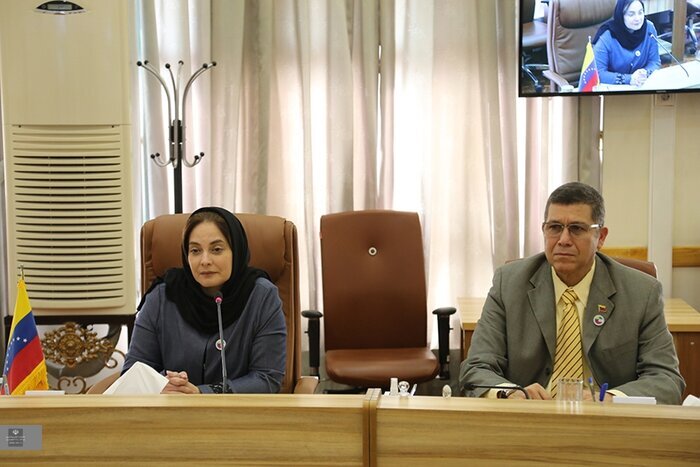Iran, Venezuela seek to expand nanotech, biotech co-op

TEHRAN – The Iranian vice president for science and technology Ruhollah Dehghani and the Venezuelan science and technology minister Gabriela Servilia Jimenez discussed the development of cooperation on stem cells, nanotechnology, biotechnology, agriculture, and animal husbandry.
In a meeting on Monday in Tehran, Dehghani said that Venezuela's familiarity with Iran's scientific and technological capabilities is a source of satisfaction and enhanced technological cooperation.
Stating that Venezuela is a rich country in terms of natural resources and human capital, he said expressed interest to increase cooperation in major fields of stem cells, nanotechnology, biotechnology, agriculture and animal husbandry, and other strategic fields.
Knowledge-based companies have reached a stage where their role in the economy is inevitable, bilateral interaction based on knowledge-based companies can appear effective in the sustainable development of the two countries, he explained.
The knowledge-based economy reaches its real development in coordination and synergy between ministries and institutions, he also stated.
Pointing to the necessity of need-oriented and market-based innovation and technology houses, he said that Iran's technology and innovation house in Venezuela is an important issue that caused the joint cooperation between the two nations.
He went on to note that in these houses, the need-oriented approach and recognition of market needs should be prioritized. Although at the beginning of cooperation, the supply-oriented approach was at the center of attention, sustainable cooperation and real development are formed when the market and needs of countries are realized.
Jimenez also for her part expressed readiness to increase cooperation, and receive Iranian scientists in Caracas, suggesting that the Venezuelan scientists and researchers be settled in Iranian scientific and research centers.
Recently, a stem cell research center was established in Venezuela to perform corneal stem cell transplantation for the first time in Latin America, she highlighted, adding, the center can achieve significant development with the capabilities of Iranian scientists.
During my visit to Royan Institute, I found out that Iran has considerable capacities in scientific and technological development, especially in the field of cell therapy, she also emphasized.
In September, more than 82 knowledge-based firms attended an exhibition in Caracas with the aim of exchanging experiences and holding meetings.
Some 200 companies attended this event and 60 cooperation contracts were signed. We tried to provide a field for interaction and synergy between companies, she said.
Nicolás Maduro, the president of Venezuela, said in September that today, Iran is an exemplary country and a country of progress, production, knowledge, and production of products.
Nanotech, biotech improvement
One of the industries that have experienced good growth in Iran in recent years, proving the country’s scientific development, is the nanotechnology industry, a subject area that has brought Iran to the world’s fourth place.
Currently, nanotech products are produced and marketed in more than 15 industrial fields based on domestic technologies and are being exported to 49 countries from five continents.
Over the past year (ended March 20), the total sale of Iranian nanoproducts has been equal to 115 trillion rials (nearly $425 million).
The expansion of nanotechnology export programs in recent years and the establishment of bases for exporting nanotechnology products to China, India, Indonesia, Syria, Turkey, and Iraq have provided the opportunity for the entry of Iranian nanotechnology goods, equipment, and services into global markets.
Some 42 percent of the products in this field are related to construction, more than 17 percent to the field of oil, gas, and petrochemicals, 13 percent to the field of automobiles, and over 10 percent to the field of optoelectronics.
Biotechnology today is widespread in all fields and is no longer limited to biomedical drugs so it has replaced injured limbs.
Currently, 20 to 30 types of biotech medicine are produced in the country in addition to kits, vaccines, and blood products. Some 80 percent of biotechnology pharmaceutical items are domestically produced.
Iran is ranked 12th in the world and first in West Asia in terms of biotechnology, as 9.5 percent of the income of knowledge-based companies and more than 60 percent of their exports are related to biotechnology.
FB/MG
